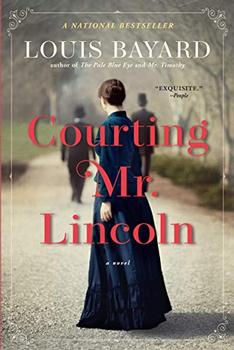Summary | Excerpt | Reviews | Beyond the book | Read-Alikes | Genres & Themes | Author Bio

A Novel
by Jon ClinchUlysses S. Grant is not one of the most famous U.S. presidents—especially compared with Abraham Lincoln, whose legacy Grant continued into the post–Civil War Reconstruction era. But novelist Jon Clinch has a habit of shining a spotlight on figures, historical or fictional, who have previously been overlooked. In The General and Julia, he depicts Grant as a kind, pensive man who won followers in wartime and peace, and whose love for his family outweighed declines in money and health.
Although Grant, the general of the title, is very much the focus of the novel, the narrative opens and closes with Julia. In 1843, Lieutenant Grant visits his old West Point roommate in Missouri, but his eye is caught by his friend's seventeen-year-old sister, Julia, whose pet canary has just died. Grant conducts a sincere Christian burial service for the bird. This first chapter is echoed in the Postlude, set forty years later, in which Julia is again grieving a loss—this time of her husband, dead at age 63; his New York City funeral cortege draws some 1.5 million mourners.
In segments headed "Forty Days and Forty Nights," Grant is living out his final days in the Adirondacks. Cocaine and morphine keep the pain of terminal throat cancer at bay long enough for him to make headway on his memoirs, which he hopes will ensure his wife's financial security after he's gone. Clinch intersperses these sections with earlier events from Grant's life, each chapter dated to make it easy for readers to orient themselves in the timeline. Segues are natural, and flashbacks are occasionally presented as if Grant is not just remembering incidents but reliving them through medication-fueled hallucinations.
One key scene from 1856 illustrates the contrast in ideology between Grant and his father-in-law, Frederick Dent. By this time Grant and Julia have three children, and money is tight. Dent and Grant have nearby farms in Missouri (the Grants' is called "Hardscrabble") and both keep slaves. Julia's childhood servant, Julia—nicknamed Jule to differentiate between them—and her brothers, also enslaved, continue to work for the Grants. He and Dent express fundamentally different views on Black people. "I know need when I see it. And I know that a black skin may cover a true heart as well as a white one," Grant says to his father-in-law. He still, however, refers to Black people as possessions: "a man ought to care for his belongings." Here, Clinch shows that although Grant later would sign legislation supporting their civil rights, he did not necessarily believe that Black people were equals.
Famous names crop up frequently, including Samuel Clemens' (see Beyond the Book), but some of the novel's most poignant moments concern ordinary people: Sam Willett, a war veteran who undertakes guard duty for the dying Grant, and Robert Terrell, Grant's valet's son. Late on, the failure of his son Buck's investment company leaves Grant close to bankruptcy—the motivation for the push to finish his memoirs. Clinch gives a balanced portrayal of Grant, making him an Everyman who has achieved great things but also made significant errors—another example being the lifelong cigar-smoking habit that sealed his fate. References to the Bible and to Greek mythology place Grant in the lineage of classical heroes whose flaws threatened their downfall, and Terrell's news of a lynching foreshadows racially motivated violence to come. This, especially, is a timely link to the present day.
My misgivings about the novel arise from aspects I wished had been explored in more depth. The title led me to expect that Julia would play a larger role. In addition, more time might have been devoted to an incident concerning Jule, which could have been an entire subplot, but instead is given only a brief mention. By contrast, much is made of Robert E. Lee's new gray wool suit in two chapters titled "The Package." Here and elsewhere, the focus sometimes felt off.
Nevertheless, the novel presents an affecting portrait of a lesser-known president and his family ties, and Clinch creates an elegant flow between the past and present. The prose style is smooth and inconspicuous, with omniscient third-person narration that sticks largely to Grant's perspective but also gives glimpses into other characters' experience. I would especially recommend this to fans of Geraldine Brooks and Norman Lock. As Clinch writes in a concluding Author's Note, figures from the past can be understood through "genuine moments of attention, imagination, and sympathy." That is the magic of biographical fiction: bringing real people and happenings to life in a way that allows us, as Clinch puts it, to "appreciate the hearts and minds of those who came before us."
![]() This review was originally published in The BookBrowse Review in January 2024, and has been updated for the
August 2024 edition.
Click here to go to this issue.
This review was originally published in The BookBrowse Review in January 2024, and has been updated for the
August 2024 edition.
Click here to go to this issue.

If you liked The General and Julia, try these:

by Ron Rash
Published 2024
Told against the backdrop of the Korean War as a small Appalachian town sends its sons to battle, The Caretaker by award-winning author Ron Rash ("One of the great American authors at work today" —The New York Times) is a breathtaking love story and a searing examination of the acts we seek to justify in the name of duty, family, honor, and ...

by Louis Bayard
Published 2020
From the prizewinning author of Mr. Timothy and The Pale Blue Eye comes Courting Mr. Lincoln, the page-turning and surprising story of a young Abraham Lincoln and the two people who loved him best: a sparky, marriageable Mary Todd and Lincoln's best friend, Joshua Speed.
Your guide toexceptional books
BookBrowse seeks out and recommends the best in contemporary fiction and nonfiction—books that not only engage and entertain but also deepen our understanding of ourselves and the world around us.